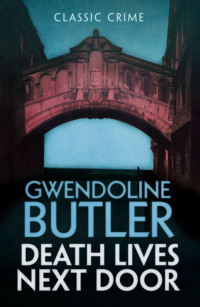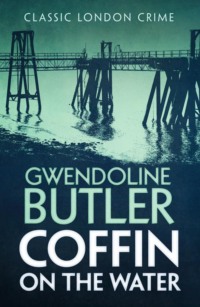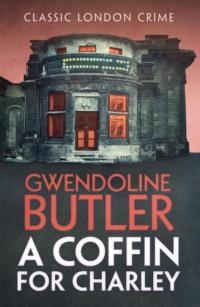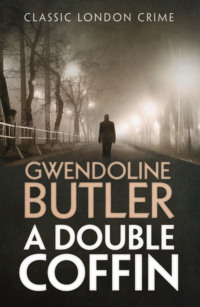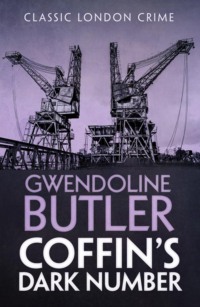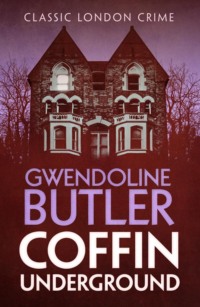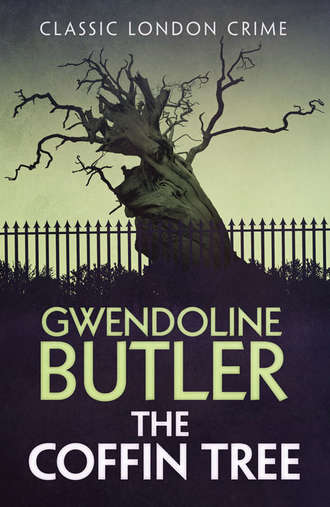
Полная версия
The Coffin Tree
And there had been Felix, the happy man, aptly named. Twenty-eight years old, ambitious but friendly, and now dead.
Dead for a month. One young friend gone by violence.
He looked round at them: Sir Alfred he knew less well but he was beginning to enjoy the sight of that sturdy figure always wearing what looked like, but surely couldn’t be, the same suit and the same grey suede boots. He had small feet and delicate hands. Jane Frobisher, talking away with her usual animation, but she did not seem as happy as usual in her lovely clothes that Coffin, under the tutelage of Stella, could recognize as couture. Of course, bankers earned that sort of money, even in these days of recession. Professor Edna Halliday, by contrast, looked as if she had got out of bed and put on whatever was to hand. Skirt and striped shirt were clean but creased, her hair pinned back with a casual hand so that bits of it were escaping. But it would be wrong, he thought, to describe her as unattractive. On the contrary, she was full of life and humour and he knew for a fact that she had a string of lovers, usually two at a time. He had never been invited to be one himself (the list was by invitation only), she liked them younger, much younger. This did not seem to be held against her by other women and she got on with everyone. Clever lady.
You never noticed what Clare Taylour was wearing and that was probably part of her own skills and why she was such a success as a detective.
The two policemen had the right anonymous clothes as well, although Teddy Timpson was young enough to wear a sharp tie. Fraser was in uniform and putting on weight.
Coffin felt sympathy there; his hand strayed to his own waistband. Marriage seemed to be fattening; accordingly, Stella had put him on a starvation diet. He didn’t get enough exercise, that was the trouble.
Coffin was on the committee but would not be chairing it; that task fell to Teddy Timpson. He would also withdraw when one of the candidates whom he knew appeared.
‘Important looking lot, aren’t we?’ said Sir Ferdie jovially. For such a tiddly little job – he did not say this aloud but Coffin could read his thoughts.
‘I’ve been lucky to get you all,’ he said. ‘But it’s an important job, more important than it looks.’
An innovation of his own. The officer appointed would have the rank of chief inspector or superintendent, according to age and experience, and would liaise with all the important institutions in his bailiwick.
There was too much what Coffin called ‘loose crime’ floating around.
The unit would be small but hand-picked.
As had the committee been; it had been carefully put together whether the members knew it or not. At least one of them was beginning to suspect and to wonder if acceptance had been wise.
‘You ought to look after us, though,’ said Sir Alfred, ‘important we may be, healthy we are not. Now there’s me, on tablets for my blood pressure, there’s Geraldine who’s had collagen injections –’
‘Oh, surely not.’ Geraldine was not famous for her beauty but she had kept what looks she had and glowed with health. Coffin hoped she could not hear what was being said. Geraldine was younger than the other women there, in her early forties, whereas they were in their fifties. She had the careless charm of someone who always got her own way. She was generous, cheerful and interested in men. She had made one careful advance to the chief commander, more as an experiment than anything else, but she had not been annoyed when he did not respond. She was younger than the others but a little bit older than she admitted.
Coffin knew all the ages. Among other things. ‘Oh yes, I recognize the shine. And one of us has just had an operation for cancer and we’re probably all on tranquillizers. Not you, of course.’
‘How do you know all this?’
‘By keeping my eyes and ears open. You ought to do the same.’ Perhaps I do. Coffin thought, perhaps I do. I don’t know everything, but I always know something – that’s my job.
Years as a detective had made him observant of friends and foes alike. It was automatic with him. For instance, he had seen Sir Alfred travelling to London from Oxford (where they had both been attending the same conference) on a second class ticket in a first class coach. Naughty or just absent-minded? He had seen Geraldine entering the block of buildings in East Hythe which housed a doctor, a solicitor and on the top floor, an inquiry agent.
Josh Armer, the solicitor, was not the most respectable lawyer in the business and was friend to more criminals than Coffin cared to think about. Professional friend, of course, Josh always sent in a bill. The phrase ‘there is no such thing as a free lunch’ might have been invented for him. A plump, gently spoken man, Josh was a classical music fan and supposed to be an expert on Rachmaninov.
Arabella Hammer, the female inquiry agent upstairs, was his equal and they were reported to be lovers.
Then he had remembered that Josh Armer belonged in this district, one of the families that had lived here for decades in a vast kindred. There weren’t so many of them left now, but they popped up occasionally. Geraldine’s family was such another.
You had to remember that some of these dockland areas were like villages where kids married to live near mum, just as mum and dad had in their generation. There was a lot of intermarrying and probably a bit of incest as well. Such a way of life was dying out of course, but pockets still remained. Kindred loyalty went back to the Anglo-Saxons and earlier, when an eye for an eye meant just that.
‘What’s the name of this new unit?’ asked Sir Alfred, examining his papers. ‘Seems to have escaped me.’
Coffin let his eyes flicker round the room before he answered. Teddy Timpson had married a local girl and that meant he was sometimes biased. The trouble with being a detective was that you automatically suspected everyone of having secrets.
Especially when you had one or two yourself.
Coffin said, ‘The provisional name is Unit AN, but it hasn’t got a settled name yet,’ he went on. ‘Perhaps the committee can think of one.’
‘Leave that to Geraldine, shall we?’ said Ferdie. ‘She’s the word girl.’
‘Long time since I was a girl,’ called Geraldine over the top of her whisky, ‘but thank you for the name.’ She took a swig of her drink, but actually, as Coffin observed, drank very little. ‘When are you going to let me have a look at your mother’s memoirs? I could make a lovely TV series out of them.’
He laughed. ‘That’s what worries me.’
‘What a lady!’
A lady, in the genteel, white gloves and carrying-a-handbag style, his mother had never been, thought Coffin. A wanderer, an adventurer, and several-times-married lady, probably several times a bigamist and probably a liar into the bargain, leaving behind three abandoned siblings who only discovered each other late in life. There was John Coffin himself, his beautiful sister Letty and industrious William in Edinburgh and goodness knew who had sired him.
‘I think Stella wants to get her hands on it.’
‘I bet she does … Where is she now?’
Coffin hesitated. ‘In New York at the moment …’
‘I thought it was Spain.’ He saw the glitter in her eyes which was not drink nor sympathy. ‘It was Spain.’ Damn you, Geraldine, for being so well informed. ‘But she flew straight on to New York.’
He let them linger with their drinks for one more minute, then he caught Teddy Timpson’s eye and nodded. Time to begin.
Round the table, they shuffled the papers in front of them. Why did a committee always fidget? But they always did, some worse than others; this lot were moving the papers as if they were about to play a hand of cards with them … In a way they were – poker – but they didn’t know it.
‘We have three candidates, whom we will see in alphabetical order,’ began Chief Inspector Timpson. ‘Two men and one woman.’
He had their names in front of him: Simon Daly, from the Met, a very strong record and destined to go high; James Wood, who was from his own force, ambitious, pushing, a difficult character but able.
And Phoebe Astley.
‘The woman is good,’ he had said to Timpson. ‘She was doing a very fine job where she was. I was surprised when she put in. She deserves serious consideration. You’ll know when you see her.’
And that is where I will go out, Coffin nodded to himself, partly because I know Phoebe – she is a friend and for a time was more than that so I don’t want to seem prejudiced – and partly because I am absolutely determined she is chosen.
And also because I have fixed it that you will, Phoebe.
I want you here, Phoebe, and I want you now.
He looked across at Teddy Timpson who stared back. Both of them were skilled at communicating without words. They were both remembering a conversation that they had had earlier in the month, and behind that conversation was a train of events which explained why he wanted Phoebe on his team.
He had spoken to Teddy Timpson two weeks ago. Not a man with whom he felt wholly at ease or wholly safe. He had a lot to tell him; information that Timpson had to be told, but all the same, Coffin had edited it carefully. Placed as he was, at the top of an uneasy pyramid, he kept a lot quiet inside him. Some topics were hotter than others.
Security, for instance, where he was in communication with various government agencies. Sometimes he was obliged to pass on all he learned to the responsible units in his force; at other times, he kept details to himself.
For a few months now he had had meetings in the old City of London with a committee made up of men from the Treasury, the Bank of England, the City of London, the Inland Revenue and the hard boys from Customs and VAT, a man from Scotland Yard and Coffin; the major clearing banks were represented also.
The committee was called the Resources (Police: London) Committee – RPC for short – and a man from the Treasury kept the minutes, in his head presumably, since no one ever saw them again. Too secret. Coffin made his own notes of what went on. There was never an agenda, the Chair, Althea Adams from the Bank of England conducted the meeting in her own terrifying way.
The resources of the three London Forces, the Met, the City of London, and his own, it did not discuss. Money, it did.
They were a group of men of influence and power who were really looking into what one member called ‘dirty money’.
Coffin found these meetings, which took place at irregular intervals and in different rooms, both stimulating and alarming. He enjoyed meeting all the trained, tough-minded professionals.
Earlier in his career, he would have found them intimidating, products as they were of schools and universities he had never entered; the Treasury man, Winchester and New College (of course); the two men from the clearing banks, Eton and Trinity, Cambridge (again, of course) and Althea, Cheltenham Ladies College, Girton and Harvard (this time, not of course, but predictable). Now he took them as he found them: clever and hard-working.
Besides, he had done his homework: he knew that Althea had a sick child whose care preoccupied her, that the Treasury mandarin was about to divorce his wife, and one of the men from the clearing banks had just come through a gruelling treatment for cancer.
He hadn’t been able to get much about the Inland Revenue and Customs chaps, which he regretted because he suspected them of being the prime agents behind this committee.
What the committee made of him, he did not examine, but he kept quiet and took it all in. He was not surprised at his own self-confidence, but he did remember the thin youth with the dark hair who would once have been ill at ease in such company. Anyway, what could they have said of him? There’s John Coffin who’s having a bad time with his missus?
It was with all this in his mind (and when he already knew that Phoebe would be up for the new job), that two weeks ago he had suggested that Teddy Timpson meet him for a drink in the pub near Spinnergate tube station, a comfortable establishment too far away from police headquarters to be used by the local coppers. He sat waiting in the Black Dog where they had no air conditioning on this hot day so that the ice in his glass was melting fast. It was not like DCI Timpson to be late, he was a brisk and cheerful man.
But he found himself glad of the quiet time. It wasn’t the best of days. He was alone in his home in the tower of the old St Luke’s church, now converted into the three flats with the theatre complex adjacent. Stella was away, filming in Spain, leaving him in charge of the cat and the dog. The dog, Bob, who answered to any name and the cat, Tiddles, who never answered at all unless it suited, were his sole companions.
His sister Letty was in Scotland visiting brother William, probably with a view to extracting some money from him for her reeling property empire. She’d be in for a disappointment there, he thought, as William was a tight man with money. Still, it would be an interesting meeting – Greek joining battle with Greek. On the whole, he backed Letty but you could never be sure.
Then, like someone probing a sore tooth, his mind went back to Stella. She had telephoned from the airport in Madrid to announce she would not be home just yet, love, but was flying into New York, stop-over in Paris.
Not even Heathrow, London, he had noted glumly, as if she couldn’t bear to be on the same island. And to be called ‘love’ – that was bad, very bad. No one really close to Stella was ever called love in that way; it was what she called a fellow actor for whom she had small regard, or a bad director.
What had he done? Or not done? They had parted on warm, even passionate terms; he remembered it well, that night before she left, now it had all gone cold.
He would find out in the end; Stella never kept anything to herself when she was angry which he had to suppose she was, but he wasn’t sure he wanted to know. He didn’t enjoy these ups and downs with Stella. He had thought all that sort of thing was in the past, when, God knew, they had enough of them. They had met when young, too young probably, loved and parted, met again briefly before moving away from each other, and then coming together when his sister Letty had created her St Luke’s Theatre complex.
Happy ever after, he’d thought. He watched Teddy Timpson come through the door.
‘Sorry, sir. Got held up.’ The man looked flustered and hot.
‘Have a drink before you say another word.’
‘Thanks … lager, please.’
Teddy didn’t drink a lot, unlike some of his colleagues, but he probably had other vices. ‘I got held up. A double stabbing in Cock Street, in the Little Cockatoo pub.’ He drank thirstily. ‘It’s always been a bad place … it’s the landlord.’
‘Stabbed?’
‘No, he did it. His wife and the barman, they were having it off and he found out. Well, he always knew, I reckon, but only took off today. I blame the weather.’
‘At least you’ve got it tied up.’
‘Not on your life: he denies it, says some man walked through the door and knifed them both.’
‘Where was he?’
‘Hiding in the cellar.’
‘What about the knife?’
‘We can’t find it. And no witnesses, the pub was empty.’
‘Is that likely?’
‘It is round there,’ said Timpson gloomily. ‘They know when to run. Anyway, he had a bright idea, he set the place alight.’ He lifted his sleeve to his nose. ‘I still stink of smoke.’
‘Did the whole place go up?’
‘No, no, he didn’t make a good job of it.’ He grinned. ‘Mind you, it wasn’t a bad idea. Fire does destroy.’
‘I’ve said a bit already as regards what I want to talk to you about. I won’t procrastinate any more.’
‘Yes,’ said Timpson cautiously. ‘You’ve said a bit. Not a lot.’ Procrastinate … He’s an intellectual, my guvnor; he doesn’t know it, but he is. Timpson thought about an earlier chief who might have said: This is the business, boys. Or, in a jokey mood: Up boys and at ’em.
‘It’s about the new unit.’
‘Yes, the one that’s going to be liaising with all City institutions and all police units as well.’ The word was that there wasn’t much money and it was going to have to work hard. ‘A political invention to keep critics happy,’ was what someone had said. ‘It’s going to be smallish, isn’t it?’
‘Money,’ said Coffin, then sat thinking about how he should put it to Timpson, whom he had used before as a go-between because Timpson’s negotiating skills were well known. ‘Money’s short.’ He had every reason to be thinking about money. At the back of his mind, not to be discussed now with Chief Inspector Timpson, was a big money problem. He would be seeing Archie Young, now CID supremo, later.
Timpson waited. Money came in everywhere. Who knew better than he did?
Coffin looked at Timpson, wondering what the gossip was and how much he knew. ‘There’s quite a lot going on at the moment.’
Timpson kept a careful opaque look on his face.
‘You guessed?’
‘Word has got around.’
Coffin nodded. Thought as much.
Timpson was cautious enough to say nothing more: if he hadn’t been told, he wasn’t to know. He knew how to be blind, deaf and dumb when he had to be.
‘This unit needs the right top man. Or woman. I think it ought to be a woman, I’ve worked with her before and I think she has the right qualities. You are chairing the committee and I will withdraw when she is interviewed, seems fairer.’
What’s fairer got to do with it, thought Timpson. ‘Sure,’ he said aloud. ‘Of course, we have to consider all three candidates.’
‘Of course we do.’
They seemed to be understanding one another and Coffin was satisfied. ‘Have another drink?’
‘My round.’ It gave Teddy Timpson an obscure pleasure to buy a drink for the chief commander whom he both liked and found alarming. He cast around for something to say that would end the meeting on the right note. ‘Saw Miss Pinero on the telly last night,’ he came up with. ‘She’s brilliant.’
‘Brilliant,’ agreed Coffin with a tight smile. He knew he had got what he wanted. He stood up. ‘I must go. Another appointment.’
‘They’ve done excellent work,’ he said to Superintendent Archie Young just an hour later on this same day, two weeks before the crucial committee for Phoebe. They were in his own home in St Luke’s Mansions; in his flat, not Stella’s, which was on the ground floor. They still kept the two going which was perhaps one of their mistakes. Didn’t happily married people live under one roof? Or did you only meet the survivors? From Coffin’s tower he could see over all his turbulent territory, make out the roof of his headquarters where a new floor had been planted on top of the building, not adding to its beauty but certainly providing much needed space. And if he tried hard enough, he could see the top of one of his new universities and one of the hospitals – the big new Second City General Hospital. When he looked out, he tried to admire the charm of what he saw and not think about the terrible responsibility that they represented.
‘You have to hand it to the blokes who trail through financial records and know what’s going on.’
‘More so when equally clever minds are doing their best to hide it.’
Archie had climbed the career ladder quickly: the next promotion, already in line, would make him chief superintendent. He was clever, and sensible enough not to be too clever; a steady, reliable man.
‘It’s their job,’ said Coffin, without much admiration; they had landed a mess on his lap.
They had talked about this several times before, but always in this unofficial way. At the moment, since Stella was in New York (or so he believed), and Archie Young’s clever, high-flying wife was absent on a course in Cambridge, they were eating together. A modest meal sent in from the local fish and chip shop which did a splendid order and deliver service.
Coffin handed out the chips and fish which they were eating in his kitchen. In his youth, in that far away and long ago London, he would have eaten out of the newspaper but he graduated long since to the white porcelain which had been chosen, and not by Stella, and to pouring out some red wine which was about the only thing that stood up to fried cod. (Once it would have been a pot of strong tea, and still was for many and why not?)
‘I had a session with Teddy Timpson today. He was agreeable.’
‘He usually is.’
‘Yes, no trouble there. I think we’ll get the right head for this little unit.’ Even to Archie Young who knew so much about him by now, he was careful about naming Phoebe. People could tell a lot about the way you spoke of a person.
And there is always a hidden agenda, the subtext.
‘By the way, your own promotion has gone through. You’re up, Archie, but keep quiet for the moment.’
Archie Young allowed himself a flush of pure pleasure and wished he could smoke, but the Coffin establishment was a No Smoking house. Coffin did not go back to the main subject of their meeting until they had almost finished.
John Coffin commanded a police force small by the standards of his big brother the Metropolitan police force which towered over him; small by the standards of some of the big north country forces; he knew that the Met joked about the Toy Town City force but he could afford to ignore that now because he was feeling his own powers.
Rivals and even friends had expected him to fail, but he had built up a very good set of teams from the mixture of local units he had inherited. He had created his own promotion panel which he watched over while allowing it independence. But he had seen to it that the weaker officers were weeded out and clever, hard-working men like Archie Young got fast promotion. He had men and women around him now that he both trusted and liked. ‘I’ve kept you up to date: it seems that drug profits and other illegal monies are being fed into British banks. The powers that be …’ even to Young he did not name them. That might come later, but he was still bound by an oath of secrecy, ‘… are worried that it could damage the whole banking system.’
‘Money’s money,’ said the pragmatic Young.
‘Apparently not. Might seem so to you and me but the City says not …’ The City in this context meant the bankers and financiers of the First City of London, the money establishment. ‘We seem to have been given a special part. It looks as though a group of banks here in the Second City have been targeted. I suppose they thought we’d be grateful. They had us down for a collection of innocents.’
Young accepted this silently for a moment, then said: ‘I bet I could name the banks.’
‘I bet you could.’
They had three banks whose origin was far flung and international, but which gave a good rate of interest on savings and so were much used by the small depositors of the Second City.
‘Not only us, of course. The cash is being spread around widely, and as I’ve let you know, action is being taken.’
‘Sure.’
‘But it’s up to us to clear out our own little pigsty … A lot of the money is being laundered here.’
Archie Young chewed a bit of cod which was unexpectedly solid; he could see the cat eyeing him hopefully. ‘Acting on your instructions …’
‘And your own wits,’ said Coffin quickly.
‘And my own wits,’ went on Archie, ‘I’ve had a couple of men out there working on it.’
He put his fork into his food and began to stir it round as if he didn’t see it at all but something quite different.
‘It’s been a tough game to play, John.’
The use of his name, so rarely used even between the two friends, was significant.
‘Yes, it hasn’t brought them luck.’
Two men, two deaths.
Felix Henbit who had died of an overdose of sedatives and drink. Suicide? Or accident? No one could believe in the suicide.
Mark Pittsy who had died in a car crash.
Apparent accidents, both of them.
‘Rotten luck,’ said Archie, ‘some cases are buggers.’ He shook his head. ‘You get a run of accidents like that sometimes and I hate it.’


